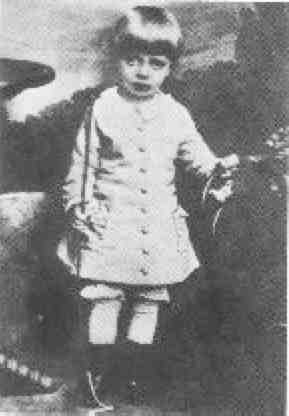
Figure 1.--Ranier is shown here at about 3 or years of age. The photograph was probably taken about 1879. Although the photograph is not clear, he appears to be wearing pantalettes and not knickers. |


Figure 1.--Ranier is shown here at about 3 or years of age. The photograph was probably taken about 1879. Although the photograph is not clear, he appears to be wearing pantalettes and not knickers. |
Rilke was a German lyric poet was for a time served a secretary to the renowed French sculptor Rodin. He evetually obtained the patronage of wealthy Germans. His prose and verse his highly musical and pervaded by a strong religious mysticism. As a boy he was codeled by his mother. She developed refined tastes in him and dressed in frilly clothes. When his father abandoned the family, he had to pursue his education in harsh military schools where the other boys did not appreciate his refinements.
During these fin-de-siecle years for the Hapsburg monarchy, German middle-class families like the Rilkes were also caught in conflicting social and ethnic pressures. Being part of the governing minority produced some of their anxieties and those of many of their compatriots. As Germans, both the poet's parents felt privileged by nature, yet neither was an aristocrat, a status that would have guaranteed their entry into German society.
The poet entered a world without moorings that allowed him no place to rest. Rene (Rainer) Karl Wilhelm Johann Joseph Maria Rilke, born prematurely on December 4, 1875, was at first so weak that his parents had to wait a fortnight before they dared take him to the Church of St. Heinrich down the street for his christening. The previous year a daughter had died a week after her birth, and Phia now watched over this newborn with excessive care. Contemporary biographers are prone to psycholanalisis. One insists that during Rilke's early years she acted as if she sought to recover the lost girl through the boy. Two of his names--Rene and Maria--make plain the mother's attempt to lend him a female identity. This may be true, but Fainer's treatment may not have been greatly disimilar to many mothers of the day who outfitted their sons in dresses and curled their hair, often at ages far beyond the age that Rainer was so outfitted. His early years were a struggle between the sensativity of his mother and sterness of his father. His mother seemed to winout.
Rene was finally breeched in 1882. His preschool world with its dreams and miseries came to an end. Phia put Rene into his "first little trousers" and took him to school. It was a German Catholic school of the Piarist Order--an educational order dating back to the sixteenth century--which suited Phia's tastes for patrician elegance. He was happy at his first school, but the military schools he subsequently attended were an endless torture for him.
Rilke pursued his education in Prague, Muich, and Berlin.
Rilke traveled extensively in Russia, Italy, France, Scandinavia \, and Switzerland. For a time he served as secretary to the celebrated French sculptor Fracois Auguste Rodin in Paris.
Rilke finally suceeded in obtaining the patronage of several wealthy aristocrats. The most prominent was the Countess Maria von Thurn und Taxis Hohenlobe.
Rilke's verse and prose are highly musical and permeated by a strong sense of religious mysticism. He is regarded by many literary poets as the greatest lyric German poet of the 20th Century. His works include : The Book of Hours, Auguste Rodin, The Book of Pictures, Stories of the Love of God, Duino Elegies, Letters to a Young Poet, Letters, Volume I, and Letters, Volume II.
Ralph Freedman, Life of a Poet : Rainer Maria Rilke
Navigate the Boys' Historical Clothing Web Site:
[Return to Main biography page]
[Return to Main German page]
[Introduction]
[Chronology]
[Clothing styles]
[Bibliographies]
[Activities]
[Countries]
[Contributions]
[Boys' Clothing Home]
